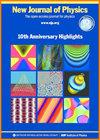Valley-polarized edge plasmons in graphene p–n junctions with pseudomagnetic fields
IF 2.8
2区 物理与天体物理
Q2 PHYSICS, MULTIDISCIPLINARY
引用次数: 0
Abstract
Owing to the inherent characteristics of collective excitations in graphene, electrical control of edge plasmons is highly desirable for nanoplasmonic applications. This study investigates valley-polarized edge pseudomagnetoplasmons in a graphene p–n junction subjected to a strain-induced pseudomagnetic field. A four-component hydrodynamic model is employed and solved via the Wiener–Hopf method, revealing the coexistence of three plasmon modes, including counterpropagating acoustic edge modes, gapless topological edge states, and zero modes. The valley polarization, as determined from the numerically exact solution, is stronger than that predicted by the approximate models. Notably, the confinement of edge plasmons at the graphene p–n junction significantly exceeds that at the graphene/vacuum interface, possibly because of the electron–hole attraction. Furthermore, gate-controlled subwavelength confinement is successfully achieved by applying an appropriate gate voltage, thereby highlighting a unique and promising attribute of edge pseudomagnetoplasmons in graphene p–n junctions.具有伪磁场的石墨烯 p-n 结中的谷极化边缘质子
由于石墨烯中集体激发的固有特性,边缘等离子体的电控制在纳米等离子体应用中非常理想。本研究探讨了石墨烯 p-n 结在应变诱导的伪磁场作用下产生的谷极化边缘伪磁性质子。研究采用了一个四分量流体力学模型,并通过维纳-霍普夫方法求解,揭示了三种等离子体模式的共存,包括反向传播声学边缘模式、无间隙拓扑边缘态和零模式。根据数值精确解确定的谷极化比近似模型预测的更强。值得注意的是,边缘质子在石墨烯 p-n 结处的限制明显超过在石墨烯/真空界面的限制,这可能是由于电子-空穴吸引力的缘故。此外,通过施加适当的栅极电压,还成功实现了栅极控制亚波长约束,从而凸显了石墨烯 p-n 结中边缘伪磁性质子独特而有前途的特性。
本文章由计算机程序翻译,如有差异,请以英文原文为准。
求助全文
约1分钟内获得全文
求助全文
来源期刊

New Journal of Physics
物理-物理:综合
CiteScore
6.20
自引率
3.00%
发文量
504
审稿时长
3.1 months
期刊介绍:
New Journal of Physics publishes across the whole of physics, encompassing pure, applied, theoretical and experimental research, as well as interdisciplinary topics where physics forms the central theme. All content is permanently free to read and the journal is funded by an article publication charge.
 求助内容:
求助内容: 应助结果提醒方式:
应助结果提醒方式:


